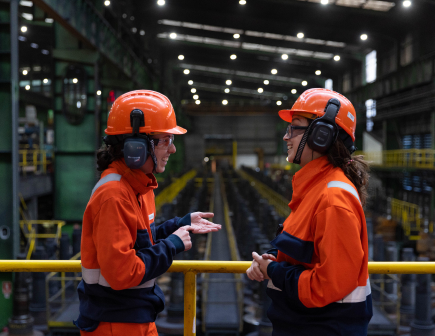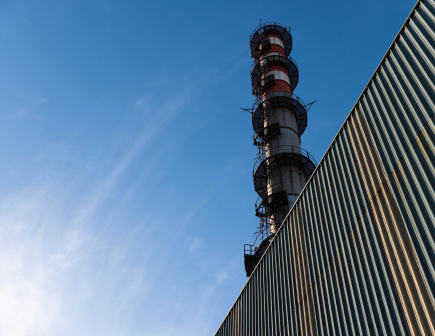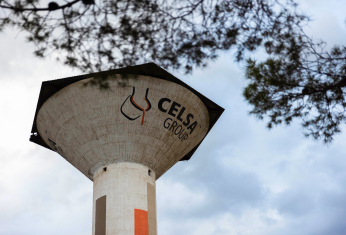Sustainability
Sustainability
Celsa has a sustainable production model embedded in its DNA that allows it to position itself as a key player in the ecological and just transition. Our non-conformity, one of the most deeply rooted values in the Group, has led us to set ourselves a great challenge: to become a Net Positive company by 2050. All these years of the company’s history, the Celsa has integrated sustainability from the beginning into its value chain, and for this reason, it has become a company that today represents an example of a circular economy at a national and international level. In addition, thanks to the network of supplier companies, customers and other agents that collaborate in the recovery of by-products derived from the main production, we are able to carry out an efficient upclycling of materials that, by recycling them, add new value to our society. And from there comes our purpose, to give infinite lives to finite resources.
At the Celsa we firmly believe in the need to continue promoting growth based on a balance between the environmental, social and economic spheres. And we are going to continue on this path to be able to leave a better world for current and future generations.
WHY
Purpose,
Vision, Mission & Values
Purpose
We give infinite lives to finite resources.
Vision
To be a leader in the generation of circular production chains to contribute to the transition towards a positive impact economy.
Mission
We are a leading business in the production of low-carbon recycled steel in Europe.
We believe in our people, their safety, effort, talent and commitment; the continuous improvement and innovation of all our processes and activities; the direction and management of your business in an ethical, environmentally friendly and socially responsible manner.
Values
WHAT
Sustainable development commitments
COMMITMENTS
At Celsa we base ourselves on seven commitments on which to base our sustainable development strategy:
The steel sector is responsible for around 5% of greenhouse gas emissions in the European Union, 7% in the world, and is one of the target sectors of the Paris Agreement. In addition, at the Climate Change Conference (COP27) held in 2022, countries representing more than 50% of world GDP established a series of “priority actions” aimed at specific sectors, including steel. For this reason, this sector is essential to achieve the objective of limiting the increase in the planet’s temperature to 2ºC and not exceeding 1.5ºC.
We are aware of the challenge that climate change poses for the planet, therefore, we have the objective of reducing our scope 1 and 2 emissions by 50% by 2030, and being climate neutral by 2050.
Our decarbonization plan is structured around two main axes:
- Scope 1 reduction: to reduce direct emissions from the process we are working on: a) Improving energy efficiency: we are working on projects to develop and incorporate new technologies to replace natural gas by biomethane, green hydrogen, electrification, etc.b) We reduce the use of fossil fuels: technologies and process improvements are studied and implemented to reduce consumption and be more efficient in combustion processes such as oxygen doping and charging in hot, which allows the steel bars from the steel mill (bills) to be loaded directly hot to the next phase of the production process (rolling furnace) to increase the efficiency of the process. Likewise, another of the relevant sources of direct emissions is the use of coal, for which we develop projects for the substitution of coal by the use of more sustainable alternative materials such as biochar, shredded tires and polymers, and the substitution of iron ore. pre-reduced by the green DRI.
- The reduction of scope 2: for the reduction of indirect emissions from electricity, work is being done on: a) Improve the energy efficiency to reduce electrical consumption of processes such as the installation of frequency inverters, and have greater control of energy consumption through analyzers, counters and mathematical models.
b) Substitute conventional energy sources for renewable energy sources through long-term energy purchase and sale agreements with a renewable development company (Power Purchase Agreements) and the contracting of electricity with Guarantees of Origin.
We are firmly committed to the recovery and use of the waste generated during the steelmaking process to promote the circular economy. Waste management not only allows us to be more sustainable, it is also a central element of our business.
Today’s world economy is only 7.2% circular, and year after year the results are more negative, given the increase in the extraction and use of materials .
At Celsa we invest to increase the recovery percentages and open new lines of business related to recycling, the treatment of plastics, and other non-ferrous metals or wood, through the use of pioneering techniques.
Innovation is crucial, and it has allowed us to position ourselves as leaders in the circular industry and in the decarbonisation of the sector. In this sense, we are advancing with our sights set on the objective of going from being 89.4% circular in 2021 to 98% in 2030.
The commitment to talent and professionalism means guaranteeing salaries commensurate with the importance of the positions held by the professional team, their level of commitment and training, placing them above the market. For this, we use objective description and valuation systems that comply with international guidelines, such as Korn Ferry, WTW and Mercer.
The team of professionals is not only the driving force that drives improvement, but is also an essential part of the history and identity of Celsa. People are essential for the present and future of a company. The main priorities and interests, in relation to people, are safety, health and well-being; the attraction and development of talent; the commitment and alignment with the values; and ethics and professional development.
Our commitment to health and safety is transversal, and extends to all those people who are not part of the organization, Stakeholders, such as: contractors, client companies, supplier companies, visitors and community of coexistence.
We are committed to the development of people, equal opportunities, diversity and the well-being of work and family life.
We operate in an industry where women have traditionally been underrepresented. Aware of the challenge, we have been applying equality policies and action plans for many years to gradually reverse this trend.
Diversity is an essential part of our corporate culture. Discrimination based on sex, race, ideology, nationality, religion or sexual orientation or any other personal, physical or social condition is not allowed, as established in the Celsa Code of Ethics and Professional Conduct. We believe in people, in their abilities and in their values.
Locally, over the years, we have built strong ties with client and supplier companies and forged lasting alliances. All this based on the fidelity of its products and services.
We act with full respect for the local cultures of the countries and territories where we operate.
We are committed to responsible supply chains and encourage communication with all interested parties to achieve a sustainable activity that is beneficial to society.
We are a business created in 1967 and with more than 50 years of history. From a rolling mill in Castellbisbal and a small steel mill, a group has been created that has recently been among the top five Spanish family businesses and in position 17 on the Ibex 35 in terms of turnover.
We have contributed 2,613 million euros to the Spanish economy during 2021, which is equivalent to 0.3% of Spanish GDP and 46% of the GDP of the metallurgical sector in Spain. One euro of added value generated by Barna Steel, S.A. contributes to generating almost 4 euros of added value in the Spanish economy.
The second generation is now at the helm of the company and its priority is to continue contributing to the industrial, economic and social development of the countries in which it operates, with a priority focus on the preservation of natural resources and decarbonization.
The Purchasing Policy establishes that the contractual conditions must clearly reflect the commitment of the supplier companies to respect and act in accordance with their Code of Ethics and the Principles of the Global Compact, regarding human rights, labour, environmental and anti-corruption. In addition, our Purchasing Policy places special emphasis on the need to minimize environmental impact, apply sustainability criteria, preserve health, and prioritize those supplier companies that are best valued.
The approval procedure for supplier companies positively assesses those that have a better performance in these sustainable aspects and that, at the same time, have an Environmental Management System ISO 14001 and ISO 45001 on Occupational Health and Safety.
GOALS BY 2030 & 2050
Our commitment to sustainability is the force that pushes us to continue growing and taking care of everything that surrounds us. We believe that all kinds of environmental, social and economic progress must go together to achieve the global goals proposed by world organizations.
The commitment that we have established in Celsa with the United Nations Global Compact implies our company’s agreement with the 10 principles established in its bases, in areas as diverse as: human rights, labor standards, the environment and the fight against corruption, and adopt measures in support of the objectives of the United Nations Nations currently embodied in the Sustainable Development Goals. The 17 global goals defined by the United Nations address the biggest challenges we face as a society from a global and transversal perspective.
This agreement does not translate into a new path for us, since, since its inception, Celsa has always opted for a direction and management of the business of an ethical, environmentally friendly and socially responsible way. Thanks to this alliance, our bond with these principles is strengthened and allows us to face the future with greater ambition.

In line with the climate objectives promoted in the European Union, we have set environmental goals, with an eye on 2030 and 2050.
En 2030:
– Reduce scope 1 and 2 CO2 emissions by 50%, compared to 2021.
– Be 98% circular.
En 2050:
– Be neutral in CO2 emissions in scopes 1, 2 and 3.
– Be 100% circular.

Our pillar is the Safety and Health of Celsa professionals. It has set a goal for 2025 to reduce the Global Frequency Index (FI) to 2.5, and reduce to 0.25 the Frequency Rate of Potentially Serious or Fatal Injuries (IFPSIF), starting in 2022 from 5.9 (IF) and 1.01 (IFPSIF) respectively.
In the medium term, and in accordance with the aspects identified in materiality, we work on aspects of diversity and inclusion. In this sense, we have set a goal for 2030 to have 30% of women in the workforce, starting from the current 13.76% Spain and France in 2022. Finally, in 2023, work will be done on a social action plan focused on talent and impact on local communities.

The biggest challenge in the short term is to incorporate sustainability into the Group’s strategy and decision-making in a structural way.
. As well as the reinforcement of transparency and commitment with all the groups related to the inputs and results of the materiality analysis.


